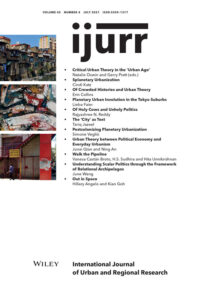The success of the ‘planetary urbanization’ approach is built upon the work of Henri Lefebvre and his understanding of the achievement of a world that is fully articulated through urban relations. However, scholars inspired by this view have normally considered his work and the Euro-American space as presumed starting points from which to observe the progression of planetary urban processes. This article proposes an alternative genealogy of planetary urbanization by looking at—both theoretically and empirically—the global ‘periphery’ of Latin America. Specifically, the article explores the early work of the Peruvian sociologist Aníbal Quijano at CELAC between 1966 and 1971. Framed within Dependency Theory, Quijano’s reflections share strong similarities and consonances with some of the critical insights that Lefebvre would elaborate only a few years later. The article thus aims to ‘postcolonize’ the planetary urbanization approach by shifting its Euro-American theoretical and empirical centres, opening it up to contributions that—due to geo-cultural hierarchies—have traditionally been overlooked within the main Anglophone debates. In so doing, the article proposes to engage in a plural dialogue in urban studies that combines planetary urbanization with the postcolonial critique.

